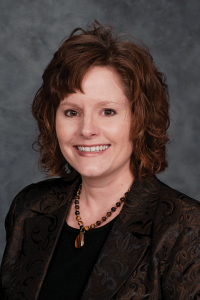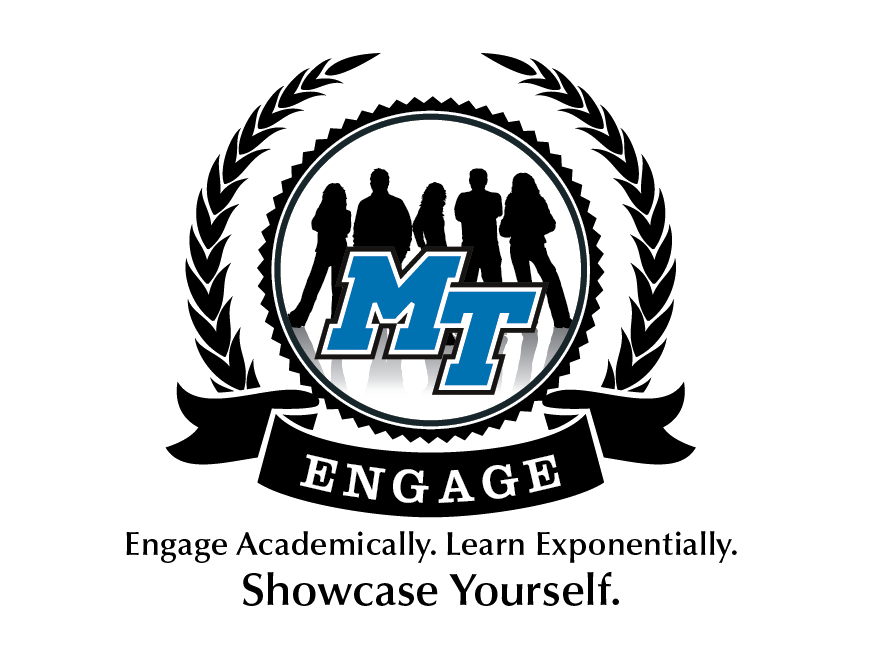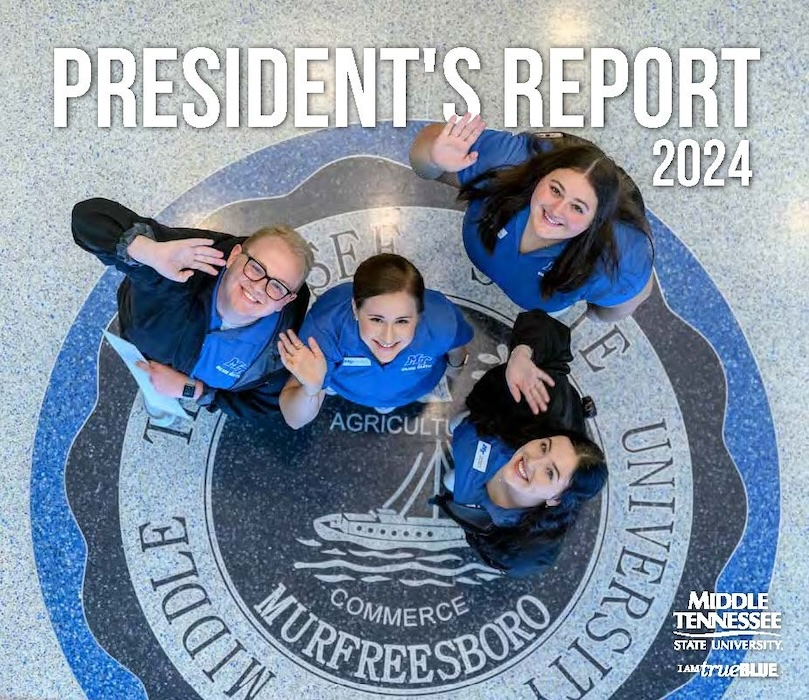Academic Affairs
Filed Under: President's Post, Featured Articles
There are so many wonderful and impactful developments occurring in our academic community that I could not possibly cover them all in the pages of this newsletter. The following, then, offers but a small snapshot of the kinds of transformative efforts occurring in our colleges and academic units across campus. True Blue!
Solid Leadership

Dr. Brad Bartel stepped down as University Provost in May 2016 and will return to his first love—teaching and mentoring students. Dr. Bartel’s efforts in enhancing student success and innovation in curriculum were significant during his tenure as provost. Let me again offer my sincere and deep appreciation and thanks to Dr. Bartel for his many contributions, specifically his leadership in the creation and establishment of the University’s guiding initiative, the Quest for Student Success. Thanks to the proactive and innovative work done by the faculty and administrators under Dr. Bartel’s guidance, our Quest efforts to improve curriculum, enhance student retention, and strengthen academic advising have been successful and garnered national praise and recognition.

Dr. Mark Byrnes, dean of MTSU’s College of Liberal Arts since June 2010, is now serving as the University’s interim provost. Dr. Byrnes, a nationally recognized expert on the American presidency and Tennessee politics, has taught political science at MTSU since 1991 and was associate dean of liberal arts from 2006 to 2009. A 1983 graduate of MTSU who earned his master’s and doctoral degrees at Vanderbilt University, Dr. Byrnes also was the recipient of one of the MTSU Foundation’s 2010 Public Service Awards. Dr. Byrnes, a native of Murfreesboro and a graduate of Riverdale High School, also has served as chairman and vice chairman of the Rutherford County School Board.

Based on Dr. Byrnes’ recommendation, I appointed Dr. Karen Petersen as interim dean of the College of Liberal Arts. Dr. Petersen, a professor of political science specializing in international relations, served as the college’s assistant dean from 2010 to 2013 and has been associate dean since January 2014.
Awards

MTSU faculty and staff received 91 new awards and contracts during FY16 to support research, public service, and instructional activities. During FY16, the University had 224 active grants and contracts with a total sponsored programs portfolio value of $40,213,452. The following are just two examples of our many our research and intellectual property development highlights in the current year. Melissa P. Towe, TRIO Student Support Services: U.S. Dept. of Education, $247,584, “Student Support Services at Middle Tennessee State University.” This one-year award will fund the continued operations of MTSU’s successful TRIO Student Support Services. This is the 15th year that this program has empowered first-generation, income-eligible students to succeed. The funding makes possible services including personal and academic counseling, tutoring, workshops, and cultural events. This is Dr. Towe’s first award at MTSU, and the successful grant proposal received a perfect score from Department of Education reviewers.

Song Cui, School of AgriBusiness and AgriScience: U.S. Department of Agriculture (USDA), $714,023, “Integrating Agricultural Remote Sensing, Landscape Flux Measurements, and Agroecosystem Modeling in Research and Teaching across Different Institutions in the Southern US.” Doug Campbell, operations manager for MTSU’s Unmanned Aircraft Systems (UAS) Operations program, is the co-Principal Investigator. This is the second USDA award for Dr. Cui and MTSU under our 2014 designation as a Non-Land Grant College of Agriculture (NLGCA). This collaboration with Texas A&M University is part of MTSU’s growing research in precision agriculture. The interdisciplinary project integrates remote sensing, landscape flux measurements, and modeling in agro-ecological curriculum and research.

Dual Enrollment
The University’s dual enrollment program allows high school students, who meet MTSU’s admissions criteria and gain approvals from their guidance counselors, to take college classes before they graduate, thus earning high school and college credits at the same time. Classes are offered online and this past year began being offered at schools in Rutherford and Williamson counties.
- 564 students enrolled in 653 unique classes for fall 2015
- 558 students enrolled in 798 unique classes for spring 2016
- 62 classes at 10 different high schools in Rutherford and Williamson County in 2015–16
- Enrollment goal of 500 students exceeded

Starting this fall, area homeschooled high school students will have a chance to earn college credits and “get a slice of MTSU” by taking classes at the University College’s new Dual Enrollment Center in the Andrew Woodfin Miller Sr. Education Center on Bell Street. Classes that will be offered on Tuesdays and Thursdays for fall semester include introductory college courses in psychology, music, and communication.
Academic Common Market
As of July 18, 203 out-of-state applications to attend MTSU through the Academic Common Market have been received. This is a 54 percent increase over last year at this time.
Of those, 164 applicants have been approved by their home states to participate in the Academic Common Market by the same date. This is an increase of 42 percent compared to last year at this time.
These increases are due to the increasing widespread reputation of our unique academic programs and also to the successful out-of-state True Blue tour recruiting events held last fall.
Academic Programs
We have continued to update and expand our academic program offerings.
This fall we are starting a new Master of Library Science degree—the only such degree in the Board of Regents system.
This fall we are elevating our successful Journalism and Animation programs from concentrations within Mass Communication to stand-alone bachelor’s degrees.
During the past year, we also elevated the Actuarial Science concentration in Mathematics to a stand-alone major. The program is the only one of its kind in Tennessee, preparing our students for what many recognize as one of the best jobs in America and that Time magazine calls one of the highest-paying jobs in America.
We also created new academic minors in Musical Theater Performance, Corporate Communication, and Arabic.
Looking forward, we continue to seek opportunities to develop unique programs to meet the needs and interests of Tennesseans.
In September, the Tennessee Board of Regents will vote on our proposal to establish B.A. and B.S. degrees in Religious Studies. If approved, we will be the only TBR university to offer this major.
We have received approval of our Letter of Application to establish a new bachelor’s degree with a major in Dance. This will be one of only two dance majors in the state.
We also had our Letter of Application approved to establish a new bachelor’s degree in Fermentation Science, which will build on the resources of our School of Agribusiness and Agriscience in the College of Basic and Applied Sciences.
We are awaiting approval of our Letter of Application to establish new interdisciplinary B.A. and B.S. degrees in Africana Studies. Again, this will be a unique degree among TBR universities.
SACSCOC Visit
MTSU completed a successful on-site reaccreditation review by the Southern Association of Colleges and Schools Commission on Colleges (SACSCOC).
In particular, I want to acknowledge the outstanding work of the dedicated team members for their many hours of preparation for this review.
 The SACSCOC review to consider reaffirmation of our accreditation represents a critical benchmark in the life of this university, as it independently validates every 10 years that our University is providing a high-quality academic experience for our students that meets the most rigorous standards.
The SACSCOC review to consider reaffirmation of our accreditation represents a critical benchmark in the life of this university, as it independently validates every 10 years that our University is providing a high-quality academic experience for our students that meets the most rigorous standards.
As part of this process, the SACSCOC on-site committee reviewed our next proposed Quality
EnhancementPlan (QEP)—MT Engage, which will enhance the educational experience of students throughout our academic colleges and programs. 



